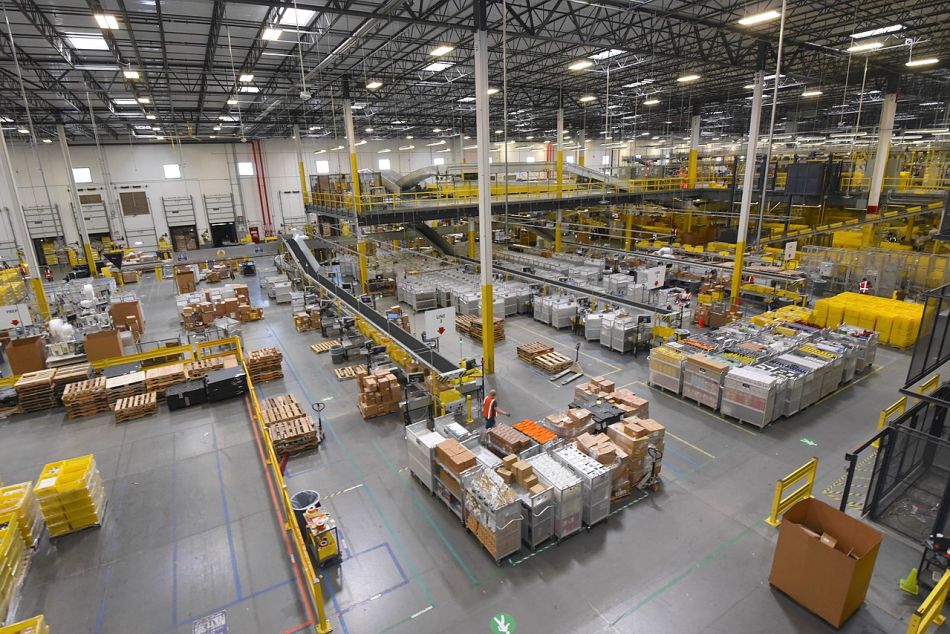Amazon and the Steep Price of Convenience
Gary Moore | Moore Lowdown

image by: Maryland GovPics
There's no mystery as to why we shop Amazon. But perhaps all that convenience isn't worth the overall cost.
Like you, I've bought my fair on Amazon. If everything in the world isn't for sale there, it's close enough, and the prices are often the lowest around. Spend a minimum amount of money on a single purchase and they bring it to your door for free. Sign up for Prime and you get your purchase in two days no matter how little you spent. You wanna talk customer service? I've never had a single problem with (not that there have been many) that they didn't immediately resolve exactly as I asked, even when the issue was more my fault than anyone else's.
So yeah, I get it. Amazon is hella convenient. But the business model that affords such convenience is costly to small businesses and even Amazon's own employees.
It would be disingenuous to discuss work conditions at Amazon without noting right up front that this megacorp employs 750,000 people worldwide, including 400,000 in the U.S. alone, making it the second-largest private job-provider for Americans. And people need jobs, so that's good. Right?
Well, yes, but it matters how you treat people once you give them those jobs⎯and investigative journalism over the last two years reveals Amazon to be particularly mercenary in its ways. For example, in July 2018 The Guardian reported on a pattern of employees being injured⎯sometimes permanently⎯in their rush to meet the strict deadlines at Amazon's "fulfillment centers" to get us our packages so quickly. It's a practice that's continued so unabated that in December 2019 The Atlantic ran a separate report, "Ruthless Quotas at Amazon Are Maiming Employees," with basically identical findings, further documenting corporate practices such as trying to get around paying workman's compensation to injured workers and even interfering with doctor visits. On occasion employees have organized strikes to protest their treatment, but Amazon has made strong⎯and thus far successful⎯efforts to keep workers from unionizing.
Amazon has also proven inimical not only to retailers in general but even to those trying to vend goods through Amazon. As Noah Smith reported last year for Bloomberg, part of Amazon’s business model is to create knock-off products to compete with those sold by independent merchants on its platform⎯and then biases customer searches in favor of Amazon’s knock-offs. Not only that, but Amazon requires merchants not to offer their products cheaper on any other retail platform.
“A recent paper by economists Feng Zhu and Qihong Liu observed Amazon’s behavior over time, and found that it tends to introduce products in niches that smaller merchants did the work of discovering by finding out what consumers like,” says Smith. “Amazon then piggybacks on their efforts. [… I]f you search for an Amazon product, you’re invariably going to see an Amazon product first. But if you search for another company’s product, you might see an Amazon product promoted at the top of the list.”
It's a serious enough state of affairs for Amazon reportedly to have been under scrutiny for antitrust violations. And this was before COVID-19. With nearly all retail businesses shuttered for over two months and counting, Amazon sales and stock prices have soared to record highs, leading Reuters to dub it “Wall Street’s biggest winner from coronavirus” and assuring the world’s largest retailer even more market dominance in the foreseeable future as people continue to stay home and smaller businesses⎯particularly the brick-and-mortar variety⎯fail to weather the crisis. That makes their long-standing practices even more damaging to competitors.
“COVID-19 is likely to reinvigorate the debate around competition in the digital era, particularly when it comes to defining market power and anti-competitive practices,” GlobalData’s Laura Petrone told MarketWatch. “Existing rules struggle to keep up with the challenges of the digital economy, where tech giants thrive thanks to their large, established customer network and low-cost capital.”
In the meantime, Amazon’s efforts to walk the line between employee safety and raking in all that money has been dubious enough for 60 Minutes to do an unflattering investigative piece on the subject, and for 13 state attorneys general to sign an open letter to Amazon expressing concerns about a range of pertinent issues, including compliance with sick-leave laws, mitigation measures, data on pertinent illnesses and deaths, and allegations of retaliations against employees who have spoken out about dangerous conditions in Amazon warehouses.
With such a consistent history of questionable business practices, conscientious consumers might want to think twice about feeding the Amazon beast. “With options like free one- or two-day shipping at their fingertips, customers are conditioned to expect quick delivery services,” wrote Vox’s Terry Nguyen last October, “often ignoring the human and environmental costs that make it possible.”
Even when ignorance is bliss, it’s still ignorance.

Introducing Stitches!
Your Path to Meaningful Connections in the World of Health and Medicine
Connect, Collaborate, and Engage!
Coming Soon - Stitches, the innovative chat app from the creators of HWN. Join meaningful conversations on health and medical topics. Share text, images, and videos seamlessly. Connect directly within HWN's topic pages and articles.
















